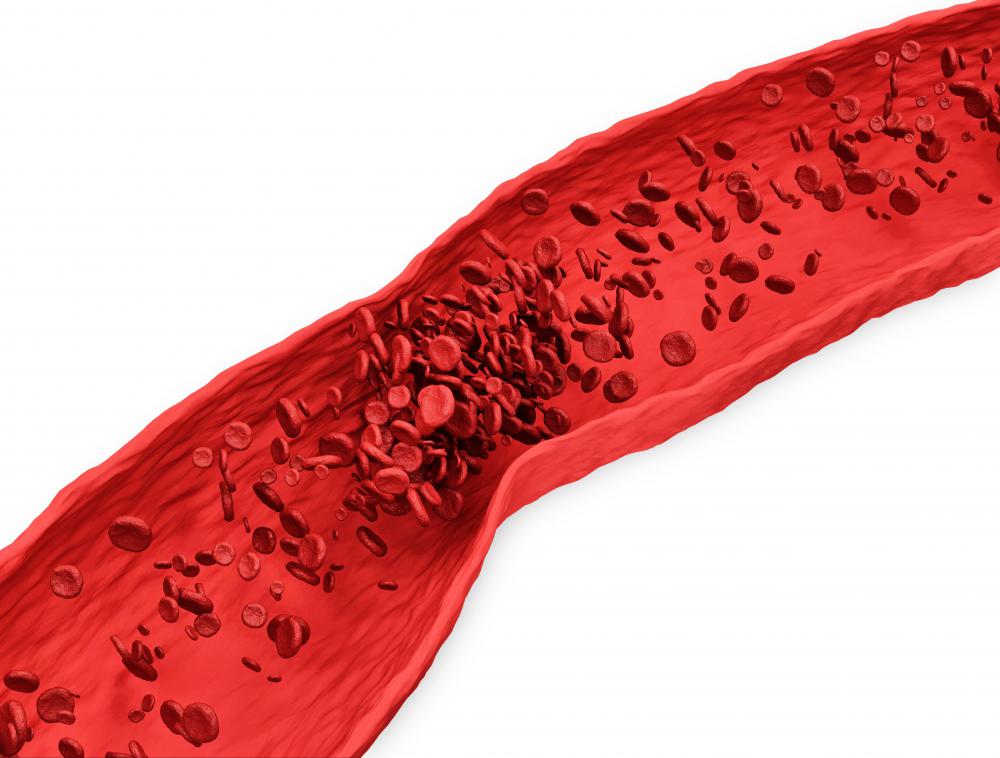At WiseGEEK, we're committed to delivering accurate, trustworthy information. Our expert-authored content is rigorously fact-checked and sourced from credible authorities. Discover how we uphold the highest standards in providing you with reliable knowledge.
What is the Difference Between an Ischemic Stroke and a Hemorrhagic Stroke?
Strokes may be one of two types: ischemic stroke or hemorrhagic stroke. The vast majority of strokes, estimated at 80%, are of the ischemic type. This type of stroke involves a constriction of blood supply to the brain, causing an interruption in the oxygenation of brain cells. Hemorrhagic stroke is characterized by the rupture of a blood vessel or severe damage to the head, which also causes an interruption in blood supply, while the flood of blood irritates and damages tissue. Hemorrhagic strokes are potentially far more deadly because of their rapid onset and the severe damage that can occur in a short period of time from the rupture of an aneurysm or venous malformation.
Ischemic stroke can be caused by a number of factors. The most common is thrombosis, in which a blood clot restricts or cuts off the flow of blood to a part of the brain. The onset of an ischemic stroke caused by thrombosis can be very slow, as the clot builds up over time and gradually reduces blood flow. An attentive medical professional can detect the signs of oncoming thrombotic stroke and take preventative steps. A number of diseases and inflammations can cause the formation of clots in blood vessels large and small, and many patients take blood thinners as a precaution to prevent the formation of blood clots.

This type of stroke can also be caused by embolism, which occurs when a blood clot breaks off or another piece of debris enters the blood stream, thus blocking the flow of blood. Usually, ischemic stroke brought on by embolism has a very rapid onset, and when pursuing medical treatment, it is urgent to figure out where the embolism originated in order to prevent the occurrence of another stroke. Embolism is usually caused by blood clots, but other chunks of matter may also be the culprit, including marrow from broken bones, fat, plaque from diseased arteries, bacteria, or cancerous cells. Heart related incidents can also cause ischemic stroke by reducing the flow of blood to all parts of the body.

Hemorrhagic stroke is also called cerebral hemorrhage, and it occurs when a vessel in the brain ruptures or begins to bleed. Hemorrhagic stroke can cause severe damage, not only because it restricts blood flow like an ischemic stroke, but also because the blood from the burst or damaged vessel can injure the surrounding tissue. Frequently, intercranial pressure builds up in the case of hemorrhagic stroke and must be reduced to prevent serious injury. Trauma, bleeding disorders, some illegal drugs, and hypertension can all cause fatal buildups of blood in the brain and result in hemorrhagic stroke. Some strokes, called subarachnoid strokes, cause bleeding into the cerebrospinal fluid around the brain and a very rapid buildup of pressure that can result in death or coma.
AS FEATURED ON:
AS FEATURED ON:















Discussion Comments
Be careful in administering aspirin! While in your situation aspirin was the correct treatment, 15 percent of strokes are "hemorrhagic" and giving an aspirin/thrombolytic agent will increase the bleeding and end up being fatal.
My husband had a TIA eleven days ago. I checked for all the signs of stroke - facial movement, sweating, slurring of speech, the 'pin-prick' test and so on.
Having nursed for a while I guessed he had had a TIA, and gave him soluble aspirin. Fortunately, when the doctor arrived, he confirmed my amateur diagnosis. This has also now been confirmed by a hospital doctor, and various tests have been carried out also to confirm this.
My husband is now much improved. I can only stress the importance of looking for signs and differences if someone with you feels strange or unwell.
Call a doctor immediately, and do not give soluble aspirin unless you are pretty sure that what the person has had is a TIA. Giving aspirin if it is a major stroke could be the wrong thing altogether.
Quickly responding to onset of a stroke can make a big difference in the outcome. Apparently there is a ninety minute window. The longer one waits the more severe and devastating the consequences can be. It seems that stroke is quite treatable if one acts quickly.
Post your comments